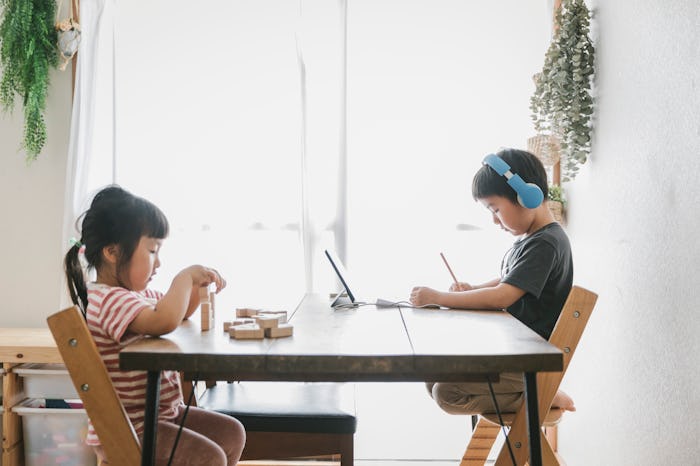Life

What's The Difference Between Homeschooling & Virtual Learning? Experts Explain
As an uneasy back-to-school season unfolds, even parents who are planning to send their kids to school in person this fall are wondering when and if a switch to virtual learning will happen again. As you weigh the available options, you might find yourself wondering about the difference between homeschooling and distance learning — and which choice might be better for your family.
"Homeschooling is not 'school at home' but rather a lifestyle that families choose as an alternative to traditional schooling," Amanda Ginn, of the homeschooling podcast Homeschool Unrefined, tells Romper in an email.
The terms "homeschooling" and "distance learning" are often used interchangeably, but they're not the same thing. For starters, homeschooling is completely parent-led. A parent or guardian creates and teaches their own curriculum, which can be similar to that of a traditional school — but in many cases, it's not.
With homeschooling comes the freedom to cater to your kid's individual interests. If you want to look at a dragonfly for an hour and call it science (an idea suggested by Ginn), then by all means, go for it. Distance learning still requires all students in a class to adhere to the same curriculum, even if it's taught through digital worksheets and videos. And while homeschooling can happen at any time (nights, weekends, whenever), distance learning also requires sticking to a strict schedule of Zoom classes and virtual assignments.
Your child will also be physically at home if they're distance learning, though they will likely be logging on during a set time. Distance learning still requires quite a bit of involvement from parents in terms of making sure kids are staying on task, but the brunt of the teaching, in theory at least, is still on the teacher.
"I think the main difference between homeschooling and distance learning comes down to choice and social positioning. You have the choice to homeschool your kids, which also means you have the money, time, and desire to do so. You know what you're signing up for," Kyle Sinkoff, LCSW, tells Romper. She adds that mandated distance learning leaves parents with no real choice other than to put on their "teacher hat," even if they have to work full time, care for other kids, or don't speak fluent English. Sinkoff isn't against distance learning, but says it's important to stress the particular difficulties for disadvantaged families (who might not have access to WiFi or a reliable computer).
Distance learning can also be more challenging for parents of kids with special needs. With homeschooling, by contrast, "you can adapt to your child’s specific learning styles more readily," Sinkoff tells Romper. She adds that the need for teacher and classroom accommodations can’t always be properly assessed virtually and it's harder to see when a child would benefit from interventions. "[With distance learning] the onus of special education falls on a parent who may be ill-equipped — due to resources, [their] own education, stress, or a need for specialized skills — to handle it."
Homeschooling can happen at any hour of the day and for any length of time, depending on your child’s progress and level. You can take time off and not necessarily adhere to district calendars. On the other hand, "distance learning takes place in the 'normal' school hours, which are also typical work hours for most families," Sinkoff says. "Homeschooling is personalized and flexible, distance learning is not."
You can see the conundrum here, and you've likely already faced the Sisyphean task of trying to do your job while navigating your child through virtual school. It can feel impossible. Even so, a May Ipsos poll conducted for USA Today showed that 59% of surveyed families are "likely" to pursue at-home education options such as homeschooling or remote learning. That stat climbs even higher when you look closely at BIPOC working parents; a second study conducted by The BDG Trends Group and Luminary found that 68% of Black parents were considering alternatives to traditional in-person learning, "compared to 60% of Hispanic or Latino respondents, 57% of Asian, Arabic, or multiracial respondents, and 46% of white respondents."
Depending on where you live, schools might not even be opening for in-person studies this fall (for example, schools in Los Angeles and San Diego will not be reopening, per Edsurge). If your child's school is opening, there's still a chance they'll only be going half-days or just a couple of days every week. Any way you slice it, it looks like many parents will be facilitating at least some at-home learning this fall.
To avoid burnout (to the best of your ability), "be the parent first," Ginn tells Romper. "Your relationship with your child is more important than any subject you need to cover."
She's speaking specifically about homeschooling, but the same message can be helpful for parents planning on distance learning. Another reminder: If you make the decision to homeschool this year, make sure to visit your city or district's website to fill out the appropriate forms. And remember, "you don’t have to replicate school at home. Ease into your school year, focus on everyone’s strengths, take lots of breaks, and give yourselves credit for everything you’re doing even when it doesn’t seem like a lot (because it is actually a lot!)," Ginn says. "This is all new and not the ideal circumstance to start this journey. Be kind to yourself and your kids."
Experts:
Amanda Ginn of Homeschool Unrefined
Kyle Sinkoff, LCSW